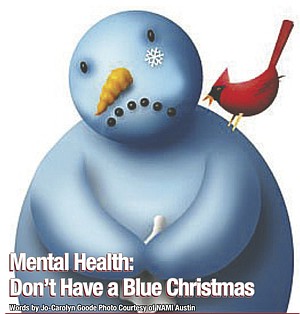12/22/2017

Once a taboo subject, Mental Health has become one of the most talked about health crisis in recent years. With the increased conversation comes an increase of people seeking help to deal with their own mental health issues. One in every five adults experiences some type of mental health episode in a year according to statistical data collected by the National Alliance on Mental Illness (NAMI). Although there are various causes and triggers for mental health episodes, the holidays are a big trigger for the added stress it causes some people. Mental health professionals Abbie Steele, MA, LPC-S and Dr. Jinneh Dyson give us a better grasp of this critical health illness.
What is Mental Health?
“Mental health is not just the presence of illness but it is also the absence of wellness,” says mental health advocate Dr. Dyson. She believes that by adopting certain healthy mental habits and incorporating more wellness type activities into your daily life one can prevent many cases of mental illness.
On the flip side is the more medical or clinical definition of mental health that is the condition or state of someone experiencing something that’s abnormal or out of the ordinary for two weeks or longer. For example, when someone close dies, it is normal for people to lose or gain weight, sleep more or less, lose the ability to concentrate and cry a lot. But if that behavior persists outside the realm of what’s “normal” (i.e. longer than two weeks) then that person may be depressed and suffering from a mental health disorder.
Something to be aware of during these winter months from November through February is a type of mental illness known as Seasonal Affective Disorder (SAD). According to Steele, who is the Director of Outpatient Services at Kingwood Pines Hospital and is a psychotherapist at her own practice Steele Minds Counseling, SAD happens as the weather changes and affects one’s mood. Occurring at the same time each year, SAD is more common in the winter months when days are longer and darker due to the time change. Darker days means that people are getting less exposure to the sun and have a lack of vitamin D and serotonin in their system. Vitamin D is crucial to brain and body function and when the supply it is low people may feel symptoms of depression.
Holiday Blues are especially prevalent in December as well for the same reasons as stated above. Not only is one still dealing with the daily stresses of life itself but compiled with that are financial stresses with gift buying, family stresses with everyone coming together, maybe the loss of someone dear that has passed on, and so on.
Dr. Dyson breaks mental health triggers down into three categories. “We have the seasonal times of the year, holidays and special occasions, and especially this time between November to February.”
Signs and symptoms of most mental illnesses generally exhibit as the same for most illnesses. A person may show feelings of sadness, fatigue, weight loss, weight gain, hallucinations, lack of energy, unexplained pain, scared or confused feelings, mood swings, isolation, or thoughts of suicide. These signs and symptoms may not be recognized by the person suffering themselves that is why it is important for family and friends to be educated about mental health to recognize them in others.
Treating Mental Health
If one sees signs or symptoms of mental illness, Steele suggests that family friends do spot checks to check on the person by calling them or visiting with them at their home. Dr. Dyson adds that during those checks ask questions like, “Are you feeling ok?” Suggest that the person talks to you or another trusted person about how they feeling or go to a support group.
Dr. Dyson suggests adopting mental health behaviors to create your best self. In her opinion, mental health disorders are brought on because something is missing from one’s life. So to properly come out of that state one must examine themselves to determine what their best self looks like and how do they become that. Translating that into action may mean limiting your time on social media so you don’t compare your life to others. Or it may mean that you increase your activity to lose weight to like your appearance. Or you go out with your girls or guys once a week to distress. It is part of Dyson’s stop, think and act method where you stop as soon as you feel yourself getting blue or depressed. Next, you think what is triggering that feeling and ask are these feelings helping or hurting me. Then you act accordingly to make the feelings go away. Every time it works,
If the behavior persists, professional help is advised. Steele suggests first seeing your primary physician to see if there might be a vitamin deficiency or if it is the beginning stages of mental health disorder. Depending on that outcome, the next move can be made to take certain medications or receive other types of help from a mental health professional.
Stopping the Stigma
Both ladies agree that compared to the past; the stigma surrounding mental health is improving. People are no longer remaining silent. With more and more celebrities like Michelle Williams, Jennifer Lewis and others telling their own tales of struggling with mental health disorders they are removing the shame once associated with it and making it more acceptable to seek treatment.
“There is something about the human brain where there is an association of shame,” stated Steele. “A lot of times people are sticking to those stigmas (of being ashamed about mental health disorders) because they have not done their own personal research. But once they do their own personal research or they speak with a professional the anxiety or the shame associated with those ideas it begins to dissipate and you feel empowered vs. afraid.”
The worse thing anyone can do is not seek help. Mental illness is like any other illness. Untreated its bad. Treated it is good and one can overcome it.
Connect with Dr. Jinneh Dyson on Facebook, Twitter, and Instagram @drjinnehdyson or visit her website jinnehdyson.com. Connect with Abbie Steele by calling Kingwood Pines Hospital at 281-404-1001 or her private practice, Steele Minds Counseling, at 832-317-6565.


